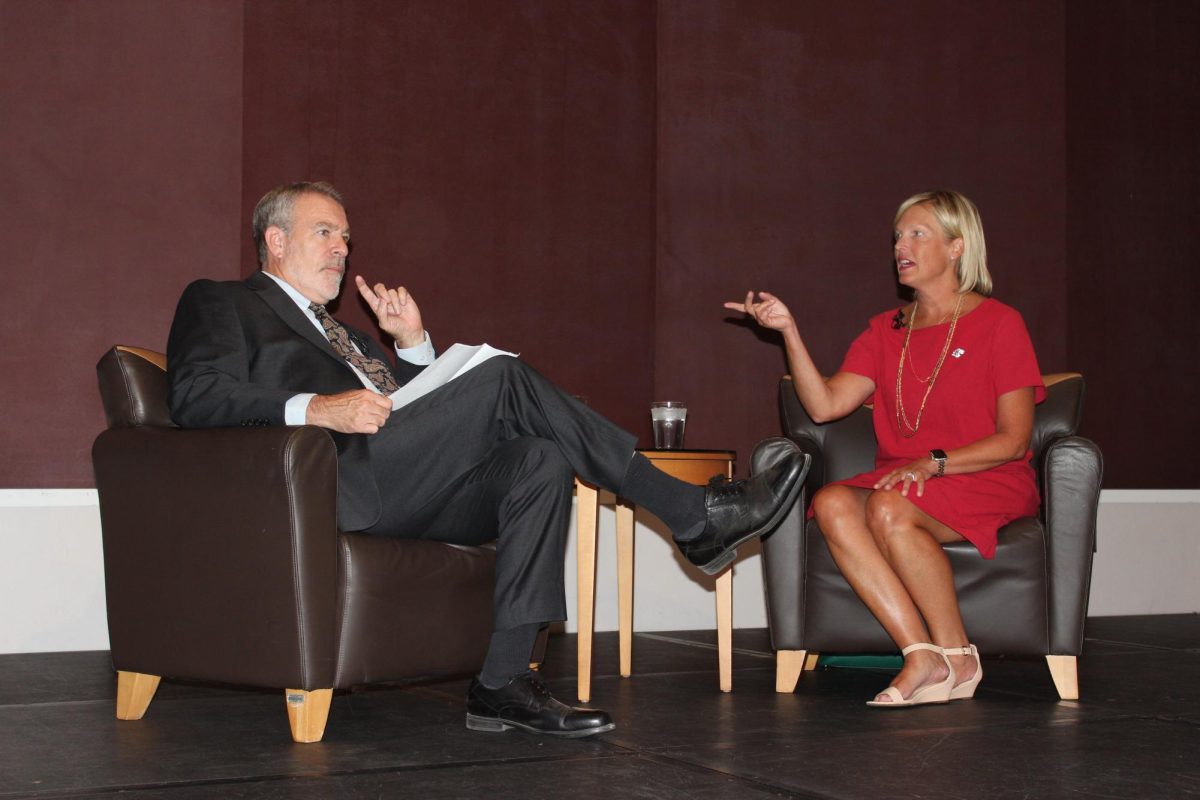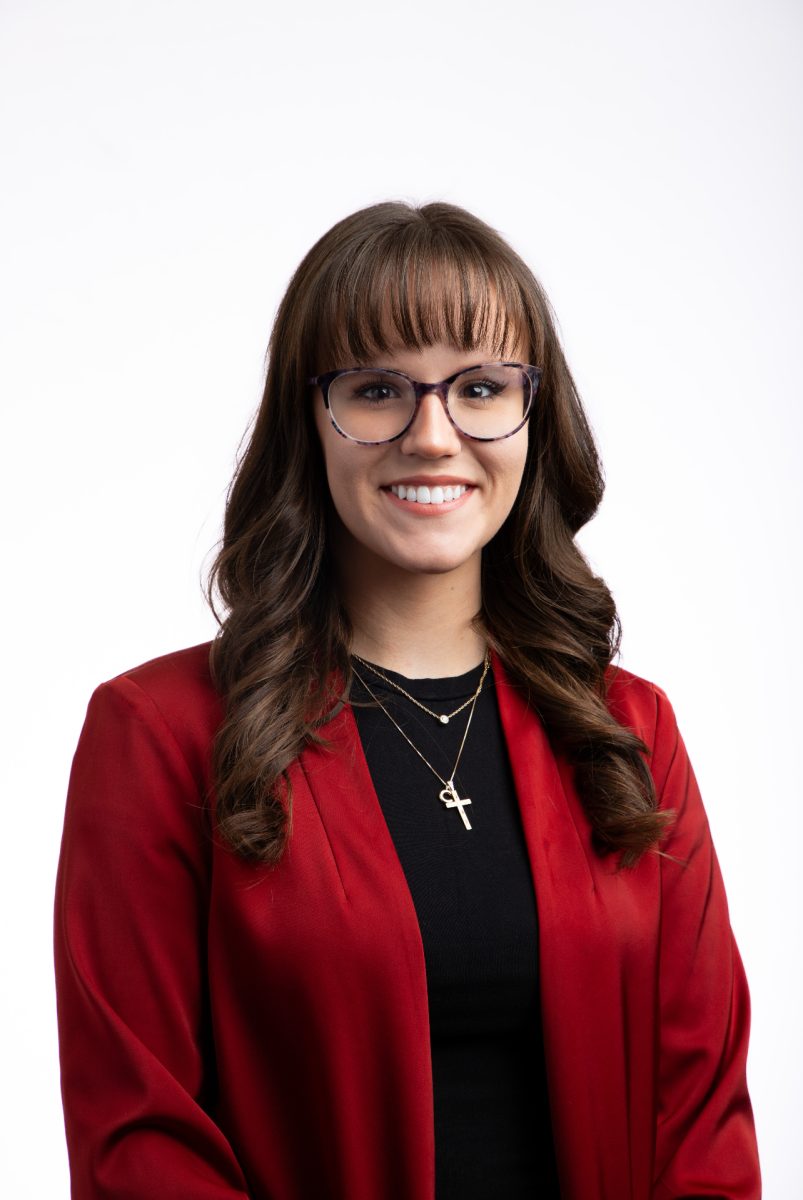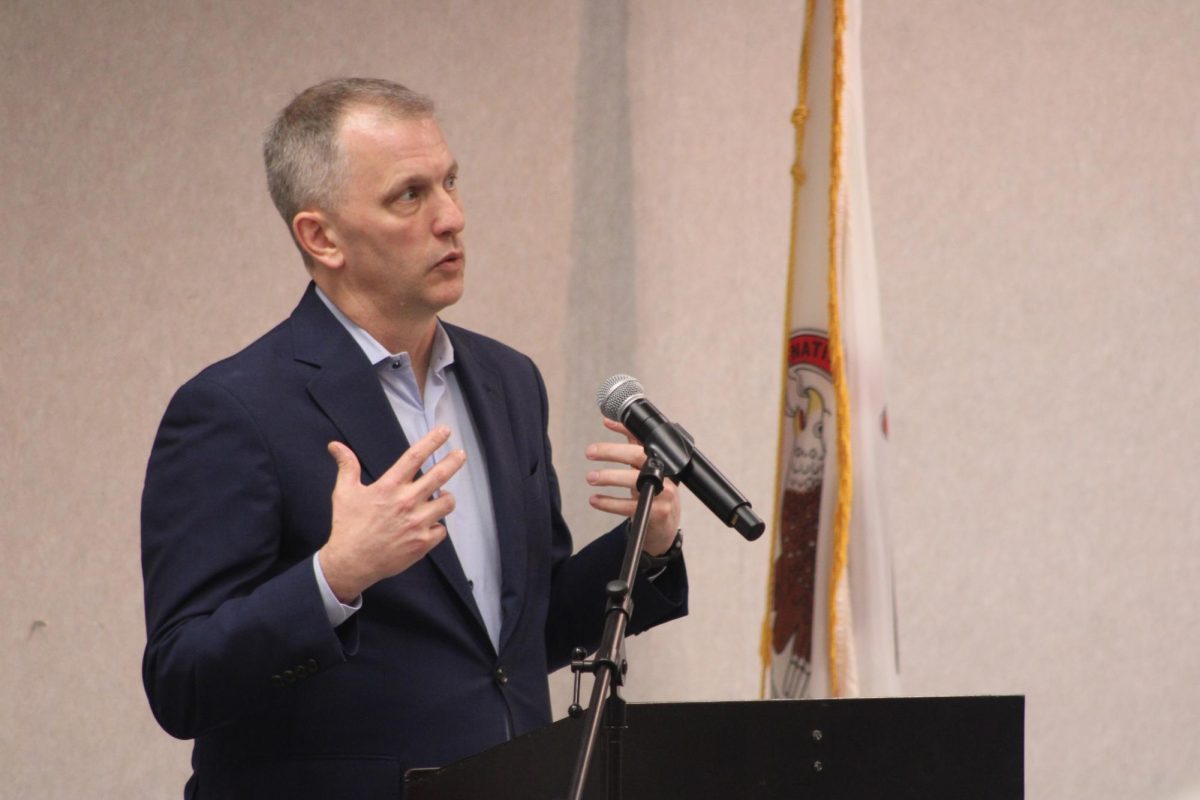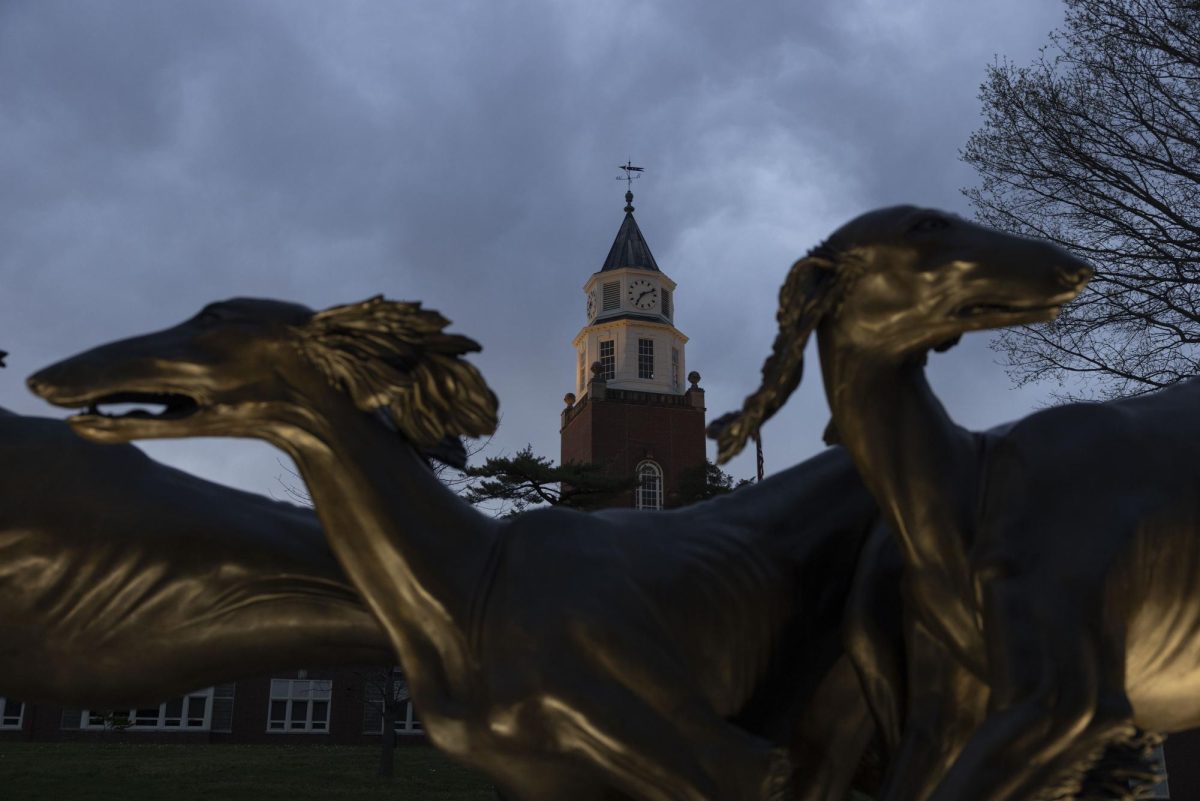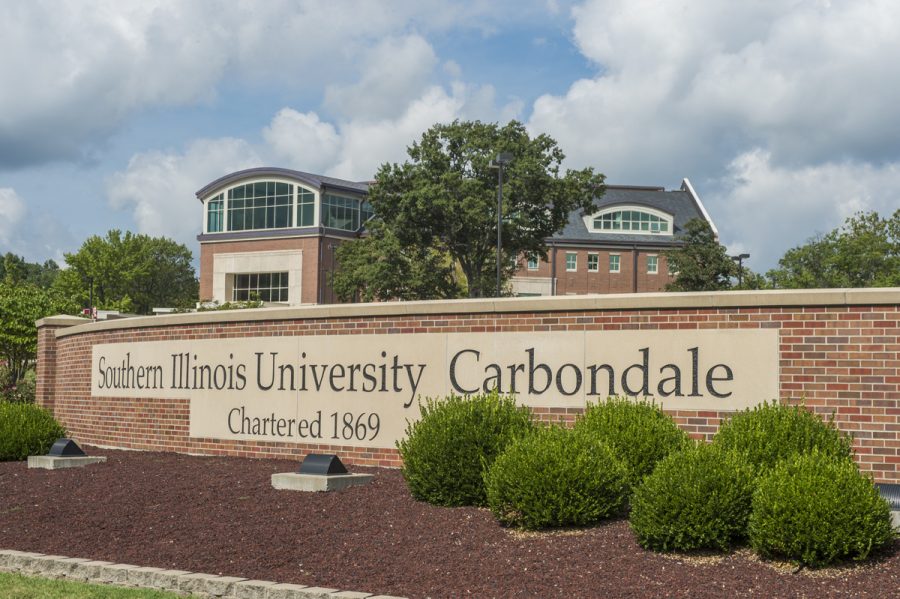The Paul Simon Public Policy Institute hosted Representative Tony McCombie at SIU to have an interview with the Institute Director John Shaw Monday Sept. 10 in the Student Center Ballroom B.
Their discussion focused on various political topics including government accountability, bipartisan, community needs and navigating collaboration between parties.
“I had a cafe in Savanna and wanted to put a sandwich board on the sidewalk, and it was going against the ordinance,” McCombie said. “I joined the City Council to change the ordinance and while I was on city council, there was a vote that I disagreed with, and then I decided to run for mayor.”
Advertisement
McCombie became the first woman to serve as the House Republican leader in Illinois in January 2023. Before that she served as the mayor of Savanna, Illinois and as a City Alderperson.
“It’s kind of interesting. I was also the first female mayor and I don’t think about it,” McCombie said. “I was just raised by a really strong mom…I had brothers and I can do what they can do.”
She never expected to get involved with criminal justice until an Illinois Department of Children & Family Services (DCFS) worker was killed in her district, said McCombie
McCombie said Illinois is one of the best places in the nation with great infrastructure and good transportation, but certain policies on local or state level make it a less desirable place to live.
“I don’t think until you take a really a collective view on true tax reform, whether it’s property tax, income tax, sales tax, the estate tax, which is the death tax, I think we’re gonna really kind of be behind the eight ball with other states that are being more proactive on tax reform,” McCombie said.
The Illinois Estate Tax requires gift taxes to be paid on estate gross values exceeding $4,000,000.
Other focuses include job creation and improved government accountability which sometimes goes hand in hand with each other, said McCombie.
Advertisement*
“I think, you can’t tax your way to prosperity. And you find that if you grow the tax base so you grow the population,” McCombie said.
When it comes to improved government accountability, McCombie said state representatives’ jobs focus a lot on continued productivity.
On her official website there’s a petition to repeal the Illinois TRUST Act saying it comes down to safety.
Senate Bill-31- the TRUST Act was signed in 2017 by former governor Bruce Rauner emphasizing that state law doesn’t allow the federal immigration law to be enforced by State or local law enforcement reliant on one’s immigration standing
The press release put out by the official state of Illinois website when the act was signed states that under the act detainment will require a judge to request a warrant. This bill is why Illinois is considered a sanctuary state.
McCombie said if someone isn’t a legal citizen Illinois law enforcement should have the right to contact U.S. Immigration and Customs Engagement (ICE) in the situation.
“I can’t even imagine if a crime was done to somebody in my family and that person was not supposed to be here,” McCombie said. “They should have to go, go back, or at least be [able to] have a conversation with ICE to say, you know, is this person? Should this person be here? Is this person detained? Has this person already been deported?”
In 2021 Governor JB Pritzker signed four more bills expanding the protections of refugees and immigrants in Illinois such as: requiring local officials to terminate partnerships with ICE, addressing hate crimes toward immigrants; expanding workplace protections and creation of the Illinois Immigration Impact Task Force.
It’s not a problem of immigration, McCombie said. She’s for legal immigration and believes the federal paperwork one has to go through is severely extensive, said McCombie.
“I think to have that sanctuary with the TRUST Act, that’s a problem, and it’s a safety issue,” McCombie said. “People that come here through the right process, they need to be safe, and so do residents. So for me, it’s about safety.”
During McCombie’s interview with Shaw, topics of discussions were emphasis on community needs, how infrastructure shapes public perception and navigating legislation.
The conversation also touched on building more bipartisan collaboration and political dynamics in the state.
McCombie said she learned that sometimes the community needs are not always at the forefront for Savanna and her District the 89th.
“I thought it was aging infrastructure was going to be a big issue,” McCombie said. “And very, very quickly it wasn’t anything that can not be seen above ground was not important to most people.”
With this being her first term as House leader, McCombie expected to be busy but with a team with a chief of staff and a team to help run things as smoothly as possible.
“I chose a team that was geographically around the state, but also I wanted people that I knew would tell me no and that would challenge me,” McCombie said. “I might not agree to it, you know, or just continue on my happy way, but one of the things that is great about our team.”
When asked about the shift in Illinoians political views, McCombie said she believes there still is a big republican population in the state.
With Republicans being the minority in the house of representatives, McCombie believes it’s their job to hold Democrats accountable.
“We are the checks and balances, and it’s important for us to do that,” McCombie said. “ It’s important for us to ask questions about the record, whether it’s in committee or whether it’s on the floor, so that the public knows what’s happening.”
When they spoke on higher education, McCombie gave kudos to Governor Pritzker and his administration for their K-12 Intitivatives, but when it comes to things like higher education, making sure it’s staying on top of improvements is something to look into.
“When you’re throwing more money at an issue or say a university, what’s the catch? Is there going to be a decrease?” McCombie said.
McCombie said she wonders if universities make agreements like decreasing tuition if regularly accountability checks would be in place to make sure they keep their word
McCombie said most people have someone in their lives attending university out of state because it’s cheaper for them and finding a solution to that is a top priority of hers.
Going into the spring term McCombie said focus will be on budgets concerns pertaining to Illinois being a sanctuary state and upcoming environmentalist bill.
“With Illinois being a sanctuary state, we are spending $1 billion on housing, education and healthcare for non-citizens and illegal immigrants in the state of Illinois. That is something that is not sustainable… so we’re going to have to address that.”
With no current knowledge of what the environmentalist bill entails, McCombie said she already has concerns with the Climate and Equitable Jobs Act which entails reaching zero carbon emissions by 2030, and have Illinois on a 100% clean energy path by 2050 and more environmental improvement projects.
This act sets goals of being 100% carbon- free by 2045, phasing out natural gasses and $694 million in financial support towards the Byron, Dresden, and Braidwood nuclear plants in support and uplift of jobs and communities.
“When here we are having all these bills for electric vehicle plants or battery plants or building up these manufacturing settings, they take a lot of energy to build,” McCombie said. “When we’re looking at shutting down completely coal and natural gas, that doesn’t make sense.”
More information on the interview can be found on the Paul Simon Public Policy Institute website.
To stay up to date on all your southern Illinois news, be sure to follow The Daily Egyptian on Facebook and @dailyegyptian on X [formerly known as Twitter].
Jamilah Lewis can be reached at jlewis@dailyegyptian.com. To stay up to date with all your southern Illinois news, follow the Daily Egyptian on Facebook and Twitter.
Advertisement



